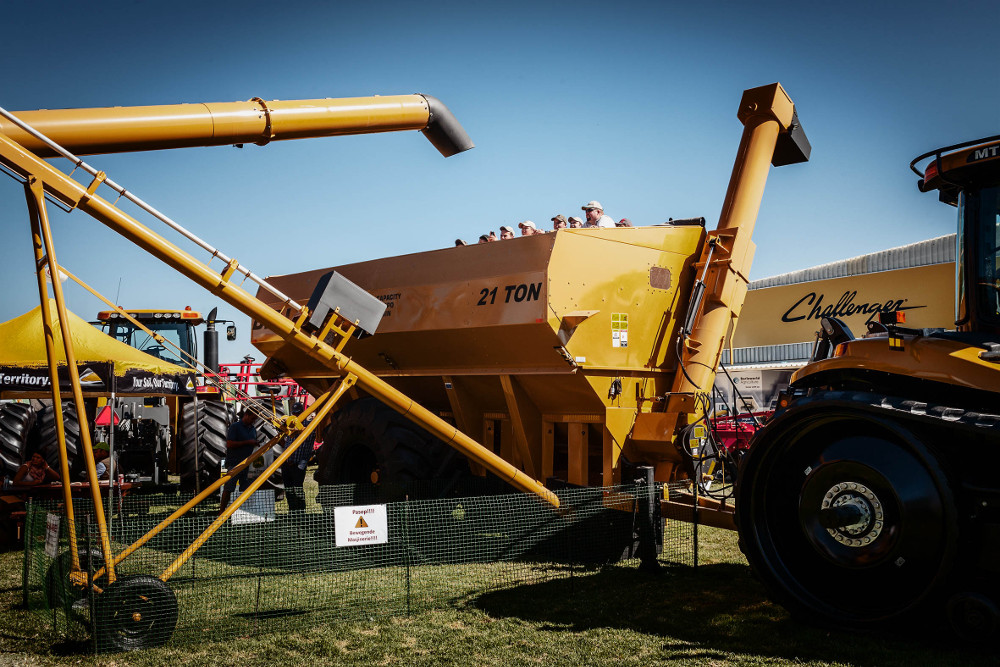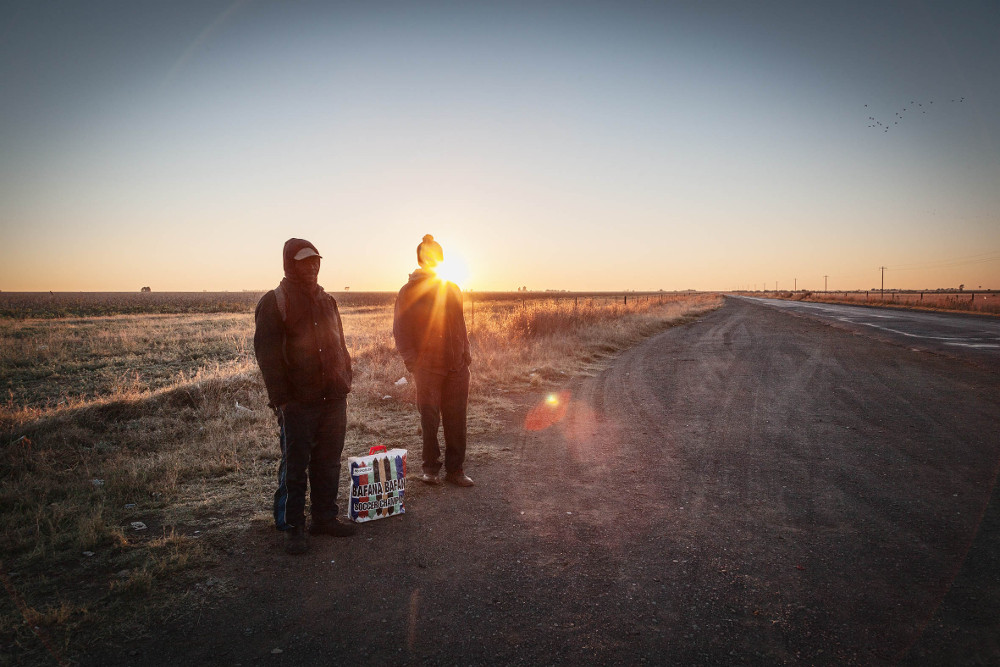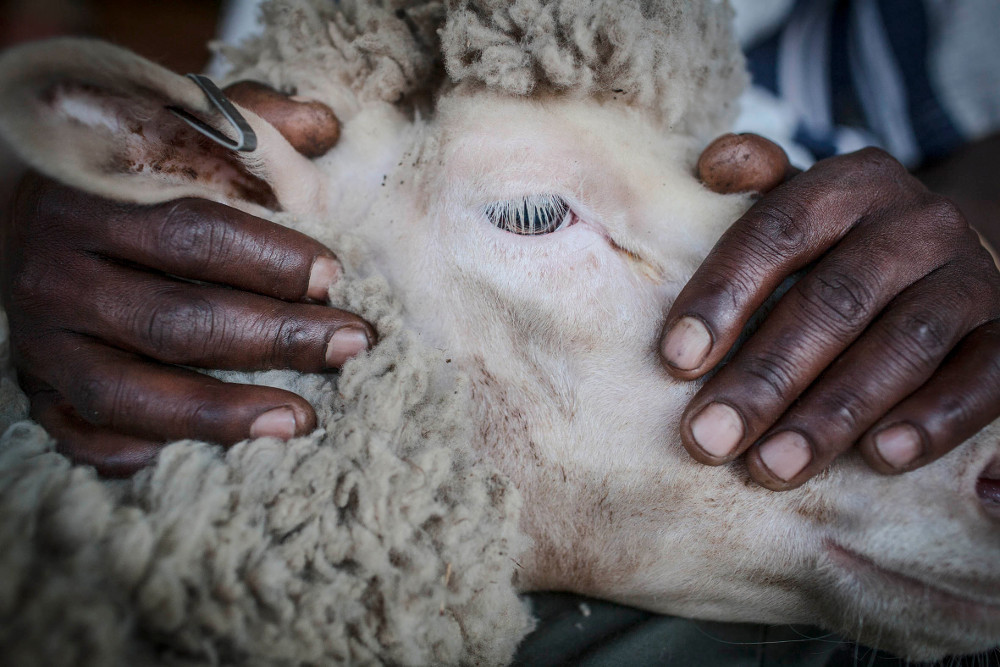The proliferation of white farmers prompted various Great Trek jokes at this year's Nampo Harvest day.
The dawning light draws men from the narrow streets of the Khotsong township outside the Free State town of Bothaville to the main arterials running to the north and west of the settlement. The men congregate in groups that at first grow slowly, then seem to reach some sort of critical mass where the numbers double and treble in a short space or time, before a vehicle – sometimes a bakkie, sometimes a cattle truck, more rarely a taxi – appears and carries them away.
A short distance up the road towards Orkney, tens of thousands of men this week congregated at Nampo Park for an annual harvest festival where, since the 1960s, farmers have been flogged new equipment, cultivars and breeds and discussed the current state of their art. But this year, as in all recent years, the state of agriculture was best illustrated not by the shiny tractors on show at the trade fair but by the contrast between the event and the lives of the farmworkers.
The farmworkers are, of course, all black. The visitors to the Nampo Oesdag (a harvest day named for a now-superseded producers’ organisation) are nearly universally white, with the occasional school group bringing the only splash of colour. The farmworkers cannot afford the price of admission to the trade show, and suspect they would not be welcome regardless of the colour of their money. The farmers find in the event a sense of community amid external threat; more than one this week joked, unprompted, about the analogy between Nampo and the defensive laagers drawn by Voortrekker oxwagons.
But right in the centre of the sprawling Nampo grounds this year was hidden a seed of slow-growing revolution. Between the animal complex with its regular sheep-shearing demonstrations (black shearers managed by a white commentator) and the hall where farm wives bought fabrics and bric-a-brac (white stall holders, black cleaning staff) serious men sat down twice a day in a discombobulatingly darkened room to plot a future very different from what surrounded them.
Land reform, these men agree with no need to think about the matter, must happen and must happen soon; there must be productive agricultural land in black hands and much food produced by black South Africans. The lives of farmworkers must be improved and soon, they agree, with better pay, better prospects and better conditions. Here the jokes were not about Voortrekker military tactics but about how the level of melanin in the queues at the stalls outside had to be increased tout de suite. And though these men with the progressive ideas included a smattering of politicians, analysts and commentators, most of them were the leaders of the farmers outside.
Pragmatic people
“You don’t have anyone who will defend bad practices,” said Louw Steytler, the chairperson of Grain SA and effective host of the entire Nampo event, on why labour “malpractices” on farms were dying, during one discussion. The agriculture sector wants more government involvement to help speed up transformation in its ranks, said Mulco Manyama, the stakeholder relations executive at Afgri, a huge agricultural services business, in another discussion.
The redistribution of land along ideological lines has happened throughout history and across cultures, said the chairperson of the Agricultural Business Chamber, Schalk Pienaar, in a third discussion, and is just one of those things farmers should consider in their business plans, much like climate change or changes in technology.
Instead of discussing whether change should come, or how to mitigate the effect of change for their members, these leaders in agriculture wanted to talk about the mechanics of the revolution: funding for the education of emerging black farmers; changing the relationship between worker and farmer; ensuring food security in the midst of a transition. And they were talking at a three-day event, dubbed Nation in Conversation, sponsored by companies that between them hold a healthy chunk of the entire agricultural revenue stream.
In an overly poetic twist, however, they held their discussion in an otherworldly bubble, a hall retrofitted with soundproofing, huge swaths of synthetic black fabric, carefully calibrated lighting and aggressive air conditioning. This makes it suitable for a live-to-tape recording of proceedings so they can be broadcast on satellite channels KykNET and Business Day TV later this month. Though the crowd outside was counted by the tens of thousands, the studio audience was best described in terms of scores.


The Nampo Harvest day featured much contrast — from the discussion in a state-of-the-art auditorium about labour to the shiny farm equipment on show at the trade fair to the lives of farmers and their workers, and the status of land, which was the focus of the event attended by tens of thousands of stakeholders and interested parties. (Photos: Gustav Butlex, M&G)
The organisations argue – and much evidence supports them – that many of South Africa’s white farmers are on board with the changes that must come. Some were always enlightened, they say, some had their attitudes changed over two decades of democracy and some are simply too smart to swim against the stream.
“I know farmers as practical and pragmatic people,” said Francois Strydom, managing director of agri-business Senwes, which dominates central South Africa. If the world changes around them, he holds, farmers will eventually change with it.
Although perhaps some change faster than others.
While the organisations doing business with and representing farmers were agreeing with one another that change is both inevitable and welcome, the real world showed how far they still had to go in goading those they represented in the right direction.
Path to reform
In the northern Free State, as in many parts of the country, farmers removed workers from their property before they could claim permanent residential space, sometimes leaving to lie fallow formal staff housing. Some will bluntly describe it as eviction, whereas others will talk about “resettling” workers in townships. Definitions aside, it turned a residential workforce into a commuting one.
More recently the farmers themselves started their own migration. In fear of farm attacks – on farms now denuded of people between sunset and sunrise – those with the financial means and land within reach have relocated their families to the small towns in the area. They, too, now commute to work every morning.
“It was just expensive to keep them [on the farm],” said one such relocated farmer of his relocated workers. “If they are there you have to give them water, you have to give them electricity, you have to give them mealie meal, you have to give them meat. If they have a sick child you have to organise transport to the doctor; the kids have to go to school.
“Here,” he says, pointing in the general direction of the local township, “there are many schools for them. It is better.”
He sees no connection between removing a small community with a vested interest in his wellbeing from the land and the danger he perceives in remaining there alone.

Farmers are keen to abolish the term ‘farm worker’ in favour of? ‘farm personnel’.
Ironically, even though these changes have at their heart exactly the attitude that the formal agricultural organisations are seeking to change, they have brought the affected farms one step closer to what these organisations envisage. The farmland becomes the factory floor, a place of work where the relationship between employee and employer is professional rather than the semifeudal one of the past, when the responsibilities farmers held for their workers bred a paternalism.
Workers in townships are easier to reach and organise into unions, which the workers want to negotiate better conditions for themselves and that progressive farmers want as a negotiating counter-party. And although the reliance on state services puts strain on those already strained services, it also makes it harder for farmers to argue that basic pay can remain low because it does not factor in fringe benefits.
Search for solutions
In much the same way, economic reality is forcing change quite separate from political pressure. Even without the rising cost of labour, analysts hold, farmers would be forced to mechanise production further to compete with the import prices of staples and food generally, especially from countries where subsidies and market protection is offered to farmers. Mechanisation means a shift from unskilled labour to semiskilled – and in some cases highly technically skilled – workers. Those who manage their workers so that they cannot attract talent, or who do not look to the training of their workers, will simply find themselves out of business.
That also happens to be politically palatable.
“We want to move away from a place where we talk about ‘farmworkers’ and start talking not about labour but about ‘farm personnel’,” said Hans van der Merwe, managing director of farmer association Agri SA.
Grain SA’s Steytler holds it is self-evident that the greatest asset for any business – including farms – is its people. Senwes’s Strydom sees a strong correlation between successful farms and good labour relations. They advocate not so much a change in relations between farmers and workers as the logical continuation of a trend already emerging: farmworkers who are valued, and valuable.
The skills of such new-order farm employees make them professionally highly mobile, with the prospects that farmers could start competing to attract the best and brightest; a shift from a market in which those who pay the least and provide the worst working conditions profit most to one with upwards pressure on wages, with or without centralised bargaining.

Sheep-shearing demonstrations were a popular attraction.
That, however, is also where the bright future advocated by organised agriculture comes back into conflict with reality.
“There are five million people in this country looking for jobs that do not exist and another 2.5-million who are gatvol,” the discussion leader for Nation in Conversation, economist Theo Vorster, told session after session.
How does agriculture transform into this glittering vision of professional, nonracial food production while also helping to find employment for those jobless people? Suddenly the conversation turns vague, or turns to food security or the need to ensure profitability in the agricultural sector in order to keep it sustainable.
Organised agriculture has no answers.
To the evident surprise of agricultural business leaders, the political answer to this political question comes from a politician.
“Farmers must grow to say ‘I want not only employees on my farm, I want to produce new entrepreneurs who will produce tomorrow’,” Agriculture Minister Senzeni Zokwana told the gathering on Tuesday morning.
The assembled business people immediately grasped the carrot-and-stick nature of Zokwana’s call: prepare your own workers to participate in land distribution or you might find yourself saddled with a black “partner” who owns part of your farm some years down the line. But it takes the better part of a day for the deeper possible implications to sink in.
“I get it now,” one of the business leaders says early on Wednesday morning, in a candid, not-for-attribution interview. “The minister was saying that we could push the obligation to employ people down the chain. The guys who are just starting out, they won’t have the big capital for the equipment, so they’ll be labour-intensive. We don’t need to be labour-intensive ourselves, but we do have to create the new farmers who will be labour-intensive.”
He laughs, delighted at the neatness of the solution.
Only later in the day does he see flaws in his interpretation and revert to cynicism about the demands of the political environment, albeit a cynicism somewhat less pronounced than it had been before.